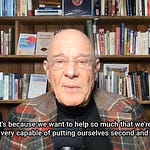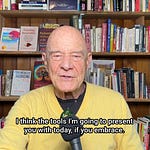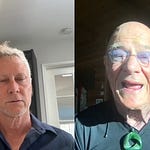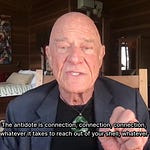Dear friends,
As a longtime advocate for psychedelic medicine, I believe transparency about risks is essential - we must not follow the pharmaceutical industry's path of minimizing adverse effects.
That's why I'm currently writing a book specifically focused on the challenges and risks of psychedelic use.
When Dr. Daniel Kruger shared his groundbreaking new research with me, I immediately knew the data needed to be included in my manuscript before I sent it to the publisher. Kruger et al.’s study of over 1,200 psychedelic users provides a comprehensive look at what actually happens when people use these substances in natural settings – as opposed to a controlled, therapeutic setting.
While I've spent decades studying the therapeutic potential of psychedelics, Kruger's research reveals critical data about risks that deserve our full attention. His work bridges the gap between sensationalized dangers and uncritical enthusiasm, offering something more valuable: data-driven clarity about what really happens outside clinical settings.
Golden light,
Dr. Richard Louis Miller
Links & Resources
Tripping into Treatment: Comparing Initial and Current Motivations for Psychedelic Use, by Daniel J. Kruger et al. Journal of Psychoactive Drugs
Psychedelic Therapist Sexual Misconduct and Other Adverse Experiences Among a Sample of Naturalistic Psychedelic Users by Kruger et al.
The 5 Most Common Psychedelic Risks (Based on 1,200+ User Study)
As someone who has witnessed both the healing potential and challenging aspects of psychedelics over five decades, I was particularly struck by my recent conversation with Dr. Daniel Kruger. Having once taught at the University of Michigan myself, I found his research approach refreshing - neither demonizing these substances nor ignoring their risks.
1. Emotional Challenges (74.3% of Users)
The most common experiences were profound feelings of sadness and loneliness (51.6%). However, as I've observed in my own practice, these emotional states often serve a therapeutic purpose. "Quite a few people said there are no bad trips, just difficult trips," Kruger notes. "Even the difficulties have value."
2. Physical Manifestations (54.3%)
Body tremors and shaking are remarkably common. Having guided numerous sessions, I can attest that these physical responses, while unsettling, are typically part of the release process. As Kruger emphasizes, "These altered states of consciousness... the words on paper might not even do justice to the visceral experience."
3. The Guide Problem
Here's where the data becomes truly concerning: underground guides show a roughly 1-in-20 rate of inappropriate conduct, compared to 7.4% with licensed practitioners. This validates my long-held concern about underground practices, though we must acknowledge that expensive clinical programs ("tens of thousands of dollars") force many to take this risk.
4. Legal Vulnerability
One-third of respondents knew someone arrested for possession. After 50 years of advocating for research, I've seen how criminalization creates a dangerous cycle: "When this is happening underground," Kruger explains, "people might not report misconduct because they're in fear for their own legal jeopardy."
5. Ego Death and Panic States
Nearly every experienced psychedelic user encounters what feels like death. I remember my first LSD experience vividly - the terror was profound until I learned to "let go." Kruger's research validates this: "You might feel like you're dying... you might think that the state you're in is going to last forever."
Why Take These Risks?
Despite these challenges, interest in psychedelics continues growing. Kruger's research reveals an interesting pattern: "As people get older, the motivations shift towards therapeutic... young people take risks, but as people age, they're looking more for healing."
This aligns with what I've observed - the potential benefits often outweigh the risks when approached thoughtfully. However, this makes accurate information about adverse effects even more crucial. We must learn from the pharmaceutical industry's mistakes and be fully transparent about both benefits and risks.
Moving Forward Safely
Kruger emphasizes preparation as key: "Prepare your mindset... prepare your intentions... prepare your environment." As someone who has both experienced and guided countless sessions, I cannot emphasize enough the importance of this advice.
With Oregon and Colorado implementing regulated services, we're at a crucial turning point. While these programs offer safer options, their limited availability means most use will remain "naturalistic." Understanding these risks isn't about discouraging use - it's about ensuring those who choose this path can do so with eyes wide open.
Exploring Death, Spirituality, and Healing: Join Me on Practice of the Practice Podcast
My recent conversation with Joe Sanok on The Practice of the Practice Podcast just went live. I had the pleasure of discussing how Western culture's perception of death contributes to anxiety and fear, and examine alternative perspectives that view death not as an endpoint, but as a transition.
I also shared some powerful tools for emotional well-being - from the simple yet profound practice of abdominal breathing to the emerging research on psychedelic medicines in treating end-of-life anxiety.
If you're interested in learning more about mental wellness and the tools I've developed over my decades of practice, I encourage you to tune in.
Your support means the world to me. If you find value in the conversation, consider subscribing to the show and leaving a review. This helps more people discover these important mental health resources.
Now Available: Psychedelic Medicine at the End of Life
You can now order my latest book, Psychedelic Medicine at the End of Life: Dying Without Fear. This work represents a culmination of my decades-long journey as a clinical psychologist, exploring how psychedelics can transform our approach to death and dying.
The book examines how substances like LSD, MDMA, and psilocybin can be powerful tools in confronting our fears of mortality, ultimately leading to richer, more fulfilling lives. I'm honored to include insights from renowned experts in the field, as well as my own experiences.
Here's what some esteemed colleagues are saying:
James Fadiman, Ph.D., calls it "a deeply uplifting, clear, and compassionate guide to dying and how psychedelics, used correctly, diminish our fears about approaching the door that opens at the end of our life."
Charles S. Grob, M.D., describes it as "a masterful overview of an area of vital importance to our modern world... a valuable resource and contribution to the growing field of psychedelic medicine."
Julie Holland, M.D., notes that "Psychedelics may offer a mini-death rehearsal, offering a glimpse of spiritual oneness, enabling us to be less afraid at the end of our lives."
I hope this book will inspire meaningful conversations and new perspectives on how we approach the end of life.
My Books:
Psychedelic Medicine at the End of Life: Dying Without Fear (release date: November 5)
Freeing Sexuality: Psychologists, Consent Teachers, Polyamory Experts, and Sex Workers Speak Out
Psychedelic Wisdom: The Astonishing Rewards of Mind-Altering Substances
Psychedelic Medicine: The Healing Powers of LSD, MDMA, Psilocybin, and Ayahuasca
Integral Psychedelic Therapy (co-edited with Jason A. Butler & Genesee Herzberg)









